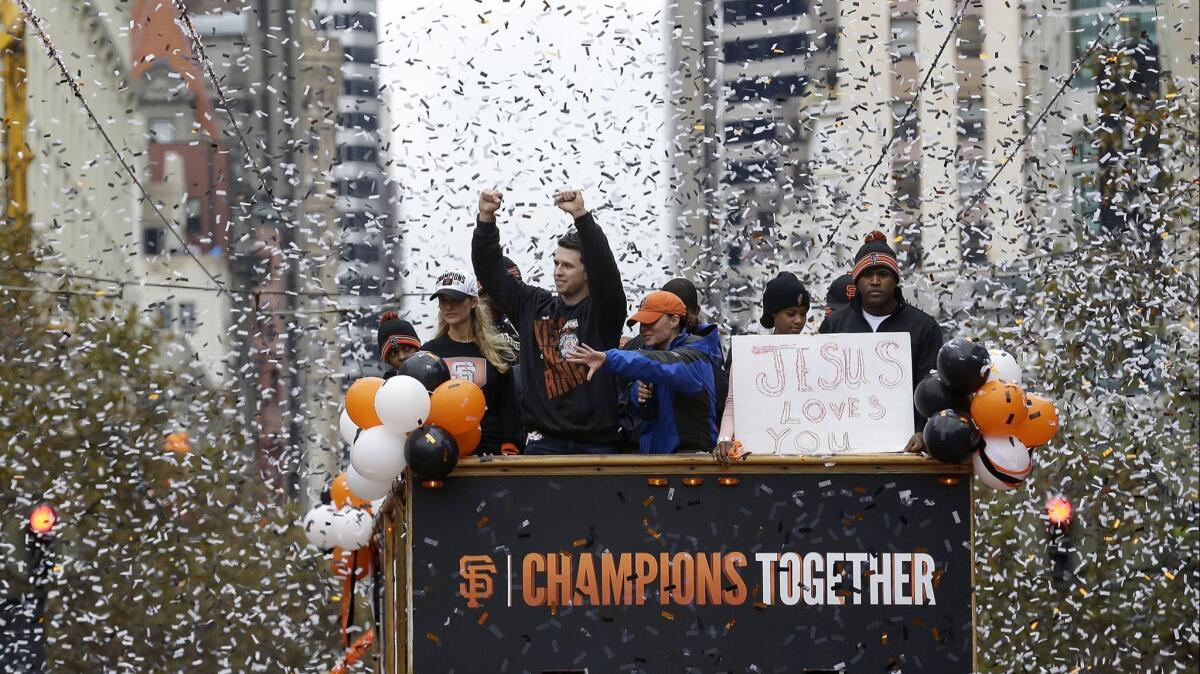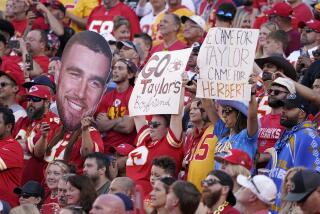On Politics: A Giants owner backs a Mississippi Republican. To some San Francisco fans, that’s more than an error

San Francisco loves its Giants.
Long before the team delivered a remarkable three World Series championships in five seasons, the franchise was lodged deep in the city’s heart, starting with its 1958 move west from New York.
The arrival of major-league baseball came as San Francisco was changing from a boisterous blue-collar port city into a sophisticated mini-Manhattan, for better and worse, and produced one of the great sports rivalries, with the hated Dodgers to the south.
Whatever its performance on the field, which lately has ranged from bad to awful, the franchise has been a consistent source of uplift throughout the community, raising millions of dollars for good works and staking forward-looking stances on civil and gay rights years before those attitudes were embraced by the mainstream.
So there was no small amount of anger and despair at the news that one of the Giants’ owners had, with his wife, donated a combined $5,400 to the election campaign of Mississippi Sen. Cindy Hyde-Smith: a Republican candidate who joked of attending a public hanging in a state scarred by a history of lynching, who winked at the notion of voter suppression in a state that did so with lethal force and who proudly celebrated its treasonous Confederate past.
The sum was a relative pittance, coinage compared with the millions of dollars that Charles Johnson has contributed to conservative candidates and causes nationwide. But it was enough to prompt outraged calls for a boycott, which moved with quicksilver speed beyond San Francisco, the Bay Area and Northern California to the furthest reaches of social media.
Soon enough, Johnson was asking for his money back. In an interview, he told the San Francisco Chronicle it was all a misunderstanding. “I think she was stupid,” Johnson said of Hyde-Smith, stating his contribution was made before he was aware of her public-hanging comment.
Johnson also condemned a racist radio advertisement in Arkansas created by an organization that he supported with $1,000. He called himself “a believer in racial harmony” and said, “I don’t like the idea of politics affecting anything that I do with the Giants.”
For some, that was enough.
Civil rights attorney John Burris and the local head of the NAACP, the Rev. Amos Brown, retracted their call for a boycott to the relief of, among others, the city’s former liberal mayor Art Agnos.
“The Giants are the preeminent corporate citizens of San Francisco,” said Agnos, who, while in office, fought to keep the franchise in town. “To boycott and condemn them for a mistake — a clearly revocable mistake — is to misplace the energy of the civil rights movement.”
To Agnos and others, the Giants are about much more than Johnson, even if he stands to profit from the team’s financial success as its largest shareholder.
“Honestly, I’d never heard of Chuck Johnson,” said Jerry Roberts, a former political writer and editor at the Chronicle, who’s been a rabid Giants fan for decades. (He skipped out the day after his third daughter was born in October 1989 because, he said, he’d stuck around postpartum for the first two but never attended a World Series game.)
“He’s some rich guy whose worldview doesn’t have anything to do with them,” Roberts said of Johnson and the relationship between the team and its city. He suggested Johnson’s political contribution “really cuts against the grain of who they are as an organization” and was no reason to boycott.
The controversy might have ended there. Hyde-Smith won Tuesday’s runoff against former Democratic Rep. Mike Espy, albeit in a relatively close contest. Many in San Francisco seem willing to forgive the Giants organization and gladly forget about Johnson. (A truly silent partner, the 85-year-old billionaire, a former head of Franklin Templeton Investments, lives in Palm Beach, Fla.)
But for some, like Rob Stutzman, the matter shouldn’t be so quickly laid to rest.
A conservative Republican of long standing — and a Dodgers fan, no less — the Sacramento political consultant was moved by the words of Marcos Breton, a Sacramento Bee columnist who swore off the Giants as a way of saying, “We will not tolerate the promotion of hateful ideas or people in our politics any longer.”
Stutzman responded on Twitter by invoking the Rev. Martin Luther King Jr.’s famous letter from Birmingham Jail, a clarion cry of the civil rights movement. Though he doesn’t favor a boycott, Stutzman wrote that “neither party should accept candidates like [Hyde-Smith] who can’t move the country past the culture of racism.”
Following up in an interview, Stutzman suggested it was time for a reckoning within a GOP that has increasingly, openly traded on racial animus. “The current leadership of the Republican Party is taking us backwards,” Stutzman said. “It’s time to start breaking plates in the china shop … and stop being the type of party that accommodates racial politics.”
After a midterm election that devastated the California GOP’s already-thin elected ranks — owing in good part to an image of exclusion and intolerance — Stutzman suggested that anything less amounted to “a death sentence” for the party in California and eventual consignment of the national party to mere regional status.
There are plenty of Republicans who disagree, citing unfounded allegations of voter fraud to explain the GOP’s losses, or the green wave of Democratic cash that swamped Republican candidates. They decry those who see racists behind every bush, or practice what they condemn as identity politics.
It’s a conversation sure to persist in the two years between now and the November 2020 election. For $5,000, Charles Johnson dragged it onto the baseball diamond.
@markzbarabak on Twitter
More to Read
Get the L.A. Times Politics newsletter
Deeply reported insights into legislation, politics and policy from Sacramento, Washington and beyond. In your inbox three times per week.
You may occasionally receive promotional content from the Los Angeles Times.







